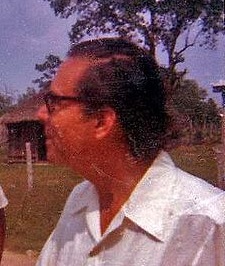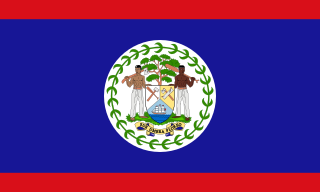
Politics of Belize takes place in a framework of a parliamentary representative democratic monarchy, whereby Queen Elizabeth II serves as head of state and the prime minister is the head of government, and of a multi-party system. Executive power is exercised by the government. Legislative power is vested in both the government and the Parliament of Belize.

The People's United Party (PUP) is one of two major political parties in Belize. It is currently the main opposition party with 12 of 31 seats in the House of Representatives. It is a centre-left Christian democratic party. The party leader is Johnny Briceño, who currently serves as Belize's Leader of the Opposition.

Elections in Belize are the duly held elections held at various levels of government in the nation of Belize.

General elections were held in Belize on 27 August 1998. The result was a victory for the People's United Party, which won 26 of the 29 seats and Said Musa was elected as Prime Minister for the first time. Voter turnout was 90.1%, the highest since independence.

General elections were held in Belize on 30 June 1993. Although the People's United Party received the most votes, the United Democratic Party-National Alliance for Belizean Rights alliance won more seats. Voter turnout was 72.1%.

General elections were held in Belize on 21 November 1979. The result was a victory for the ruling People's United Party, which won 13 of the 18 seats. Voter turnout was 89.9%.

A legislative election was held in Belize on 30 October 1974. Belizeans elected 18 members to the House of Representatives. The election was the first since the country was officially renamed from British Honduras in 1973.

Vision Inspired by the People (VIP) is a political party established in December 2005 in the Cayo District of Belize. It first contested municipal elections in the capital city of Belmopan on 1 March 2006, receiving 20 percent of votes cast but none of the seven seats. VIP operates primarily in Belmopan, but also has a presence in the Belize and Corozal Districts.

A legislative election was held in the nation of Belize on February 7, 2008. Beginning with this election, Belizeans elected 31 members to the House of Representatives of Belize instead of 29. In what was considered an upset, the opposition United Democratic Party (UDP) won the election with 25 out of 31 seats; the ruling People's United Party won six.
The Belizean municipal elections, 1996–1997 was a series of local government elections in Belize. They were held respectively on March 18, 1996 and March 11, 1997.

Her Majesty's Government of Belize, also referred to as the Belizean Government is the democratic administrative authority of Belize, a constitutional monarchy under a parliamentary democracy. It was formed in 1981 after gaining sovereignty from the United Kingdom. The constitution is the supreme law of Belize.
Bernard Quentin Augustus Pitts CBE, often known by his initials as B. Q. Pitts, is a Belizean politician and a member of the United Democratic Party of Belize.
Eric Chang is a Belizean politician.

General elections were held in Belize on 4 November 2015 to elect members of the House of Representatives. On 28 September 2015 Prime Minister Dean Barrow announced that he had advised the Governor-General to dissolve the National Assembly and to fix Wednesday 4 November 2015 as the date for the next general elections.

Municipal elections were held in Belize on 4 March 2015. Voters elected 67 representatives, 18 on city councils and 49 on town councils. The elections were a decisive victory for the ruling United Democratic Party, which won 62 out of the 67 seats nationwide. The opposition People's United Party won the remaining seats, losing control of town councils in Dangriga and Punta Gorda, maintaining a majority only in Orange Walk Town.
The Corozal United Front (CUF) was a short-lived political party active in Corozal District, Belize, in the 1970s. Shortly after its founding the party won a municipal election in Corozal Town, defeating the established People's United Party there for the first time. In conjunction with the newly formed United Democratic Party, the CUF fielded candidates in the 1974 Belizean general election, but failed to win any seats in the Belize House.
Municipal elections were held in Belize on 7 March 2012 at the same time as the Belizean general election. The United Democratic Party (UDP) won six municipalities, while the People's United Party (PUP) won three municipalities.

The next Belizean general election will elect members of the country's House of Representatives. It must be held on or before 13 February 2021.








